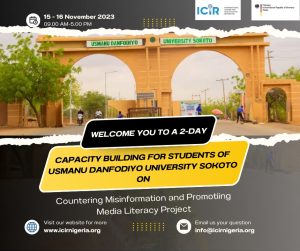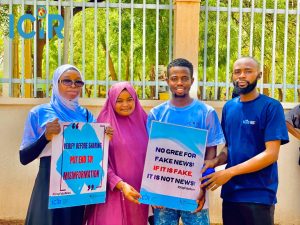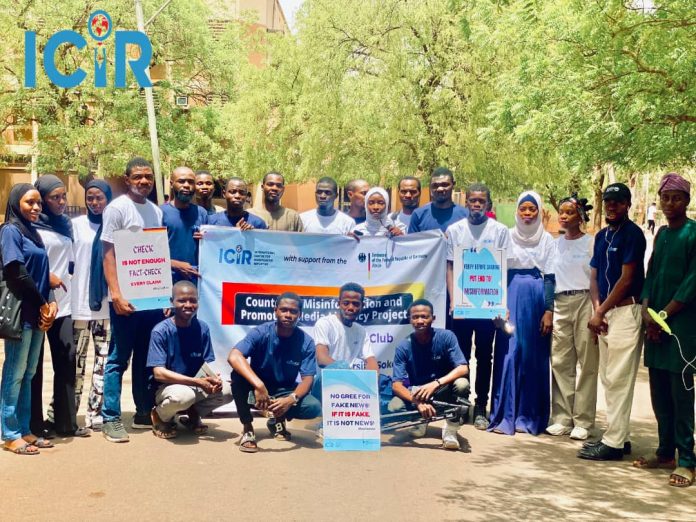By Ismaila Biliaminu Manne
Disinformation and misinformation have eaten deep into societies and with the proliferation of misinformation across Africa. However, the Fact-Check Club of Usmanu Danfodiyo University Sokoto (UDUS), a sub-club of the National Association of Campus Journalists (NACJ), UDUS and an initiative of The International Centre for Investigative Reporting, or The ICIR, held a sensitization program and campus campaign at the University community, on Sunday, 5th May 2024.
Sponsored by The ICIR, under its project of Countering Misinformation and Media Literacy, the program was executed in two sessions; a Sensitization session and a Campus campaign session focused on educating the students and members of the university community on the importance of combating information disorder, fact-checking, and media literacy.
In an interview with Harbinger, Hamid Mubarak Babajide, a 300-level student of Mass Communication and participant of the sensitization program, narrated that “the sensitization program was all about fact-checking and they told us how to fact check some claims and some kinds of websites we can use to verify fake news. They also taught us about misinformation, malinformation, and disinformation,” he said, adding that “during the program, the head of the department of Mass communication, UDUS, explained to us the concepts of fact-checking and let us to know about everything and what it takes to fact-check.”
Babajide furthered that some of the facilitators also taught them how they can fact-check claims and how to do all the processes and one of the facilitators, “Dauda Musbau, explored the tools of verifying information and how to use them.”
Speaking with one of the facilitators at the sensitization session, Shereefdeen Ahmad, a fellow of the countering misinformation and promoting media literacy of The ICIR, applauded the development of the organization that “it’s really a commendable job, trying to take it [Countering Misinformation and Promoting Media Literacy] down to the levels of university and teaching them or enlightening them [Students] how to combat misinformation, disinformation, and malinformation.”
“It is a bold step towards ensuring the information ecosystem is largely purified to the standard of everyone, to ensure that all citizens are well informed on whatever is going on within the country and outside.”
Mr. Shereefdeen told our reporter that one of the things he would love the audience not to always forget when it comes to verifying the authenticity of information is to ensure they check the source of a particular information: “like where that information emanating from. For example, who posted it? If it’s a particular post, who posted it? So you should know the source of that particular information, and they should not always forget that.”
He furthered on the things he wants them to understand or to always remember_ is to read beyond the headline, they should not just read the headline and conclude on the information, “try to read behind the headline to get the details,” and another thing is that when it comes to phishing scams on WhatsApp, like click on this link: those are clickbait. “I would also want them to be mindful of grammatical construction because all these people do make grammatical blunders which is not expected from a person who is well dedicated and competent in doing his job. Grammatical arrangement should be checked in phishing scams, and also the last note, which is, to share to ten (10) people, these are red flags,” he alerted.
He concluded that they should always check on the Source, the Author, and the content, read beyond the headline, and check multiple sources; plus checking the comment section if it’s on Facebook, of what the people are saying about it before concluding wherever the information is heading to because there will be varies of comments coming from different people, which will help them in drawing their conclusion.
Establishment of Fact-Check Club At UDUS

The Fact-Check Club of UDUS was founded by The ICIR after the second-day program of its capacity building for students of UDUS on Countering Misinformation and Promoting Media Literacy Project, following the appointment of the club’s executives and pioneer fellows, on 16th November 2023.
The capacity building was a two-day program and an initiative of The ICIR, Abuja, “with the support of the German Embassy in Nigeria, to strengthen the capacity of student journalists on the issues around misinformation and providing solutions to how information disorder can be controlled, curbed, and mitigated in Nigeria,” said Mr. Alfred Akerele, the (then) program manager of The ICIR, in 2023.
As the head of the project, Mr. Alfred charged the pioneer fellows to utilize the knowledge acquired. “My advice for the students is that knowledge is not limited, there is no limit to knowledge and when you practicalize things you learned, it remains with you and becomes part of you. So, I’ll advise the students to keep on working and exploring things they’ve learned in these few days and to also work together with them to organize programs in their schools. The more they engage with other students, the broader they become intellectually, so they need to keep doing holistic journalism, keep the fire burning, and maybe together we would be able to sanitize the Media landscape in Nigeria and have journalists that are doing the real course journalism in Nigeria.

Interestingly, the pioneer fellows held their first sensitization program and campus campaign about Fact-checking at the Usmanu Danfodiyo University Sokoto.
“Collaboration among stakeholders is the key to addressing this complex issue effectively”_ Expert
In a chat with the Harbinger, Silas Jonathan Silas, an expert on Open Source intelligence tools (OSINT) and the Research and Digital Investigation Manager of the Centre for Journalism Innovation and Development (CJID), stated that the proliferation of disinformation globally is concerning, fueled by various factors such as social media, biased reporting, and the speed of information dissemination. “Fact-checkers play a crucial role in combating this by verifying and debunking false claims.
“Misinformation’s effects on society include erosion of trust, polarization, and potential harm, as people make decisions based on false information. It can also contribute to the spread of fear, panic, and the undermining of democratic processes.”
Mr. Silas maintained that mitigating misinformation requires a multi-faceted approach, and “Promoting media literacy, enhancing critical thinking skills, holding platforms accountable for content, and supporting independent fact-checking organizations are essential steps,” he told our reporter, adding “Collaboration among stakeholders is key to addressing this complex issue effectively.”
Applauding The Program
Speaking with the Harbinger, the pioneer students coordinator, Abdulrasheed Akere, expressed his satisfaction that it was a successful program sponsored by The ICIR, Abuja. Noting the massive turnout of Danfodites (students) as an impressive and commendable act.
“We are pretty sure that participants will utilize the knowledge learned to build a society safer from information disorder. It would be impactful if such a program is sustained by being organized sessionally,” Abdulrasheed narrated. Adding that he was satisfied with the execution of the program, “we were able to contribute to human knowledge and a safer campus community. We received more participants than expected and we hope they utilize the knowledge learned efficiently.”
Mr. Shereefdeen also commented that it is a welcome development that is worth commending for, and he appreciates the Fact Check Club of UDUS, for trying to actualize this support of ICIR, and hoped they’ll continue to do more programs than this.




